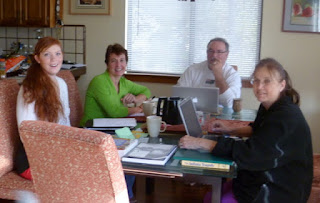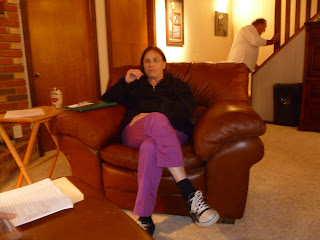I am distracted this month. There are tasks that tug and friends I’d like to see and yearnings for time with the kids. I pick up my pen to write in my journal and am only able to eke out a few paltry sentences. I open my latest rough draft and stare at the white space around the black letters, a pulsing brightness that feels impossible to interpret. Over everything, hangs a lingering feeling of worry for my mother-in-law who is battling a second round of lymphoma.
I am thankful for her but that sounds appallingly unadorned when pawing through the heaps of memories and moments she’s shared with me, with my family. To say that I am grateful or that we would be worse off without Ethelyn’s presence in our lives isn’t enough either.
My first memory of her is of a quiet knock on the door of my then boyfriend, now son’s bedroom door. (We live in the house my husband grew up in. Ethelyn’s house; the one whose buffet she lovingly stripped and stained, whose kitchen walls she chose a lovely buttery shade of yellow for, and the dining room wallpaper she hung herself.)
We were seventeen-years-old. “This door needs to stay open,” she warned. I could hear the discomfort in her voice, disciplining us like this. We leaped apart from a session of heart-thudding, sweaty-palm groping to nervously giggle and opened the door. At my house, my mother would have been at work. Or if she were home, she’d have cared less about closed doors. She let Kevin sleep over when we were seventeen. Sleepovers at my house, open doors at Kevin’s; the messages were maddeningly different.
I tried to be on my best behavior at family gatherings and holiday parties in her home but always felt I’d flubbed somehow. Maybe I used the wrong fork? Perhaps I should have asked to help with the dishes? Or maybe my offering assistance in the kitchen offended her? I couldn’t tell.
One night, after I’d made a lasagna and served it to the whole Bond family, I remember my father-in-law smacking his lips and saying, “That was delicious!” I looked to Ethelyn for her reaction and she smiled, nodded. Did she hate my cooking? Was she annoyed that her husband liked it? Were they both simply being polite? She was so even-keeled; never effusive and never sad, just steady. She was the whiteness around the vivid, black words.
My own upbringing was peppered with people less careful with their tone. If my father didn’t like something, he grumbled out loud. If my mother was unhappy, she cried or yelled. This was a world I didn’t have to exert any effort to understand – an ocean of emotions that floated on the surface, not somewhere deep and blue.
After an eight-year stretch of break-ups and reunions, Kevin and I moved to California together and, somewhere along the way, I ended up pregnant with our first child. When we called her with the news, my mother-in-law dissolved into rare and quiet tears. Standing behind Kevin, who held the phone, I interpreted her tears. How would they afford his? Where would they live? Or maybe she was simply disappointed in Kevin’s choice of me.
At my house, my own mother whooped out loud and began suggesting baby names. Within hours she’d bought us a package of diapers and the first outfit our son would wear. Neither reaction was wrong or right. It was just who they were, who they are. Practical vs. impractical, impetuous vs. thoughtful, open warmth vs. careful affection.
And though our mothers differ in personality, their common thread is generosity. From endless babysitting, to paying for our children’s after-school classes, to allowing us to live in their homes, our parents have supported us without boundaries. Because of their sustenance, we live a privileged middle-class lifestyle with children who want for nothing and a constant stream of loving relatives to take them for a milkshake or drive them to play dates.
My in-laws come to every soccer game and practice, every play and school performance. They have bought endless boxes of Girl Scout cookies and fundraiser rolls of wrapping paper. We take vacations with them several times a year to a home they purchased with their savings and the inheritance my husband’s paternal grandfather left them (setting an example of good choices and strong foundations.) And they allow us the luxury of a parent night out every time we go away with them. Because of their generosity, we’ve explored the local wineries while holding hands, taken ghost walks and recharged the romance in our busy life over and over again.
Over the years, my mother-in-law has taught me the value of a recipe as opposed to the haphazard tossing in of ingredients to see what comes out. She introduced me to activities I love, like stopping at farmer’s markets. And activities that I’d rather avoid, like long hikes to identify wild birds.
She runs a soup kitchen at her church and our children have grown into more compassionate people as they count out the plates, and serve up ladles full of food to people’s who weren’t lucky enough to have the kind of family support we benefit from. She also tirelessly pitches in at every (gigantic) church rummage sale, where my kids have gleefully learned to take customer’s money and count out change.
Of everyone in our family, she is the best listener. She has an endless patience for the rambling stories our eight-year-old longs to tell and the staying power our older kids need in order to bring a temporary peace to their relentless drama over friends and grades and places they would rather be. Grandma is the touchstone, a safe and balanced place to rest inside of.
Outside of our family, I marvel at the way my mother-in-law has cultivated a tightly knit group of girlfriends with whom she takes weekly walks, shares cups of tea, reads endless books and exchanges a love of faith. They raised their kids together, went on mission trips and fundraised for the church. Their familiarity is a harmony so perfect in pitch that I can only stand back and listen to its loveliness.
As I sat by her bedside last week, the chemo drugs dripping into her arm, one of her close friends chatted on about church happenings. When the doctor ushered us out of the room to perform a bone biopsy, my mother-in-law’s friend allowed herself the tears she’d been holding back. This, of course, unleashed a few of my own.
But the marvel of it all was the evident strength. Her friend waited until she was out of the room to cry, and Ethelyn herself smiled as we came back in. “It wasn’t so bad,” she assured us. Mind you, most people who have undergone this procedure liken the pain of a bone biopsy to childbirth or the actual breaking of bones. Not my mother-in-law. After she was released from the hospital, she went in to work.
The first time she was diagnosed with cancer, I took my husband’s lead on where to offer support and when to back off. But this second diagnosis feels like a harder path to push through. I am tempted to elbow my way in. I want to ignore her protests of, “I’m fine,” and “I don’t need you to.” Instead, I am eager to shower her with casseroles, bring her gifts of hot packs and ginger teas. I yearn to ignore the hand she’s held out to keep me at a polite distance. But I am frozen by the old fear that I will be treading on the boundaries she truly means for me to abide by.
So I am distracted.
Sometimes, the way to show gratefulness, to give thanks, is muddied up by clashing cultures, long years of careful interactions and a love so bright that the words turn themselves into silly black shapes and it’s the whiteness of the page that one truly wants to read.









































